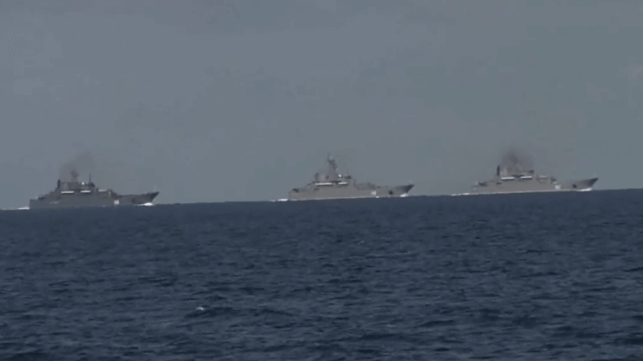Op-Ed: War in Ukraine Threatens America's Ability to Counter China

[By Ashley Townshend and Tom Corben]
As the United States slides deeper into a proxy war with Russia, Indo-Pacific countries are increasingly concerned about the long-term implications of the Ukraine crisis for America’s power and position in this part of the world.
And so they should be. While President Joe Biden’s initial approach to Ukraine struck the right balance of resolve and restraint—marshalling global allies in support of sanctions against Russia and funnelling military and humanitarian aid to Ukraine—the war is now sapping more and more American attention and defence resources.
A dangerous tit for tat is taking hold. Washington’s lethal military aid and economy-breaking sanctions signal an investment in the war that could slip beyond Biden’s original articulation of limited interests. Russia’s nuclear threats and increasingly brutal operations have triggered further US involvement, including the deployment of advanced F-35 fighters and expensive Patriot missile-defence systems to NATO frontlines in Eastern Europe, and a massive $13.6 billion Ukraine emergency bill passed by Congress last week. Calls are getting louder for a ‘limited no-fly zone’ which, though rebuffed so far, may become politically harder to resist.
All this is understandable given the humanitarian carnage. But hot on the heels of the release of Biden’s Indo-Pacific strategy, it’s unsettling to watch Washington’s strategic gaze drift, once again, away from a robust "pivot to Asia."
As we argue in a new United States Studies Centre report, these developments are especially worrying given that the Biden administration has so far failed to deliver on key defense components of its regional strategy.
Senior US officials insist that events in Europe will not see the Indo-Pacific or efforts to balance Chinese power deprioritised. Earlier this month, the White House’s Indo-Pacific coordinator, Kurt Campbell, again promised that Washington was capable of sustaining "deep commitments" in both theaters simultaneously, even at great cost, just as it had in the past.
But while America can—and must—continue to buttress European security, it doesn’t enjoy the luxury of riches or unchallenged military primacy required to underwrite an expansive global strategy against two great-power rivals.
Matching ends with means in the Indo-Pacific—America’s so-called ‘priority theatre’—requires difficult trade-offs between competing priorities, including in Ukraine. A more sustainable division of US and allied defense responsibilities in Europe and Asia is urgently required.
Biden understands this and deserves credit for attempting to match US global interests and commitments in his first year. Poor execution aside, his Afghan withdrawal showed a willingness to make tough, politically unpopular trade-offs. His initially restrained approach to the Ukraine crisis suggested he would keep it in global strategic perspective.
But Washington won’t be able to sideline Moscow from its foreign policy agenda the way it had hoped. Delays to the publication of the US national defense strategy and national security strategy suggest that Russia is forcing a hurried reassessment of Biden’s global priorities. In a worst-case scenario for the Indo-Pacific, it’s possible these documents will return US military strategy to an equally weighted focus on Asia and Europe—contradicting hard-fought efforts in recent years to make China the Pentagon’s outright priority.
This is not a callous point to make. America simply doesn’t have the military resources required to prosecute an effective multi-theater strategy in an era of great-power rivalry. Nor is it spending enough to change this equation: while the 2018 national defence strategy recommended three to five percent real growth in defense spending annually to keep pace with China and Russia, not a single defense budget since has met these targets.
Biden’s budget continues this unsatisfactory trend. And in contrast to the stark warnings from top brass at US Indo-Pacific Command, who see conflict with China as a possibility this decade, the administration’s defense budget prioritizes long-term military modernization in anticipation of high-end conflict in the 2030s - leaving the US underprepared to deal with Chinese military coercion over the next few years. Budget shortfalls are mirrored by slow-moving efforts to realign US forces globally.
Efforts to empower US allies are even more important as Washington is once again pulled in conflicting global directions. Indo-Pacific allies should advocate for more. As a priority, Australia should caucus with Japan and other close security partners to push for overdue reforms to US export controls on defense technology.
Indo-Pacific allies should also press Washington for greater insight and input into its regional military planning. A credible collective defence strategy requires clarity on when, where and how to address shared defence challenges. Biden’s effort to build support among regional allies for a Taiwan contingency is a step in this direction.
But while Taiwan is the Pentagon’s "pacing challenge," regional countries face Chinese military coercion across a far wider range of lower intensity scenarios, as China’s intimidation of an Australian military aircraft in the Arafura Sea last month attests. New strategic planning initiatives must reflect these realities.
In the end, however, these initiatives can’t change the strategic physics of the Indo-Pacific. A favorable balance of power with China can only be upheld with unprecedented US support. Alliance modernization is a necessary component of this strategy, but it’s not a substitute for a robust US military posture and presence in the Indo-Pacific.
As the conflict in Ukraine grinds on, America’s capacity to deliver an effective defense strategy for the region will depend on its ability to keep its escalating involvement in check and in global strategic perspective.

that matters most
Get the latest maritime news delivered to your inbox daily.
Ashley Townshend is director of foreign policy and defense and Tom Corben is a research associate in the foreign policy and defense program at the United States Studies Centre at the University of Sydney.
This article appears courtesy of The Strategist and is reproduced here in an abbreviated form. The original may be found here.
The opinions expressed herein are the author's and not necessarily those of The Maritime Executive.
